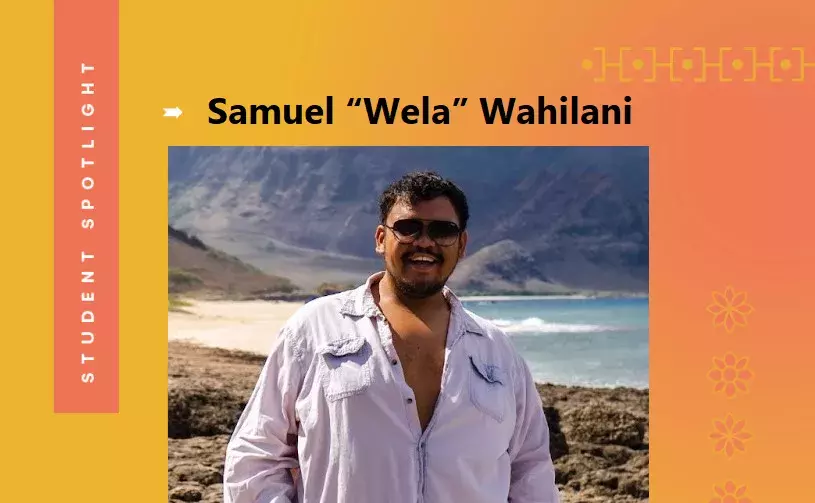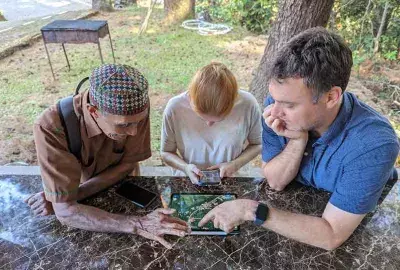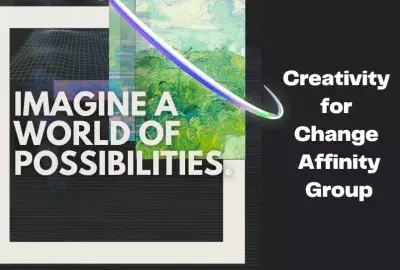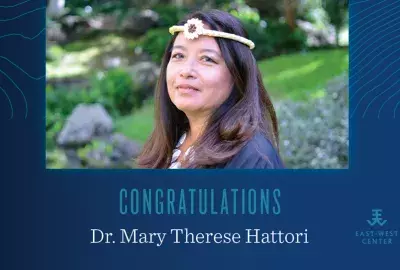Error message

OFFICE/DEPARTMENT
Mai ka piʻina a ka lā i Haʻehaʻe a i kona kau ʻana i ka mole ʻolu ʻo Lehua. Eia nō he kama no nei ʻāina kamahaʻo ʻo Hawaiʻi kuali, ka liko i hiʻilei ʻia e Welaahilani lāua ʻo Kēhaulani. Eia nō he kama o ʻEwa moku, kaulana hoʻi i kona nani pūnono. ʻO Welaahilani Wāhilani nō hoʻi kēia, he hulu maʻemaʻe o ka ʻohana Wāhilani, wiwoʻole i ka noke mau ʻana i ke ala pono no ka ʻohana a me nā ʻōiwi ʻo Hawaiʻi nei. Anoʻai ke aloha iā kākou pākahi a pau.
~A welina, or Hawaiian greeting of affection, shared by the student to honor his family, ancestors, and Hawaiʻi
Advancing Native Hawaiian issues, educational equity, and access are, for Graduate Degree Fellow, Samuel “Wela” Wahilani, rooted first and foremost in his passion for his ‘ohana and school.
“At a young age, I was taught the value of being a Native Hawaiian. I was taught by my ʻohana about our bravery to endure all that came our way, our intelligence, our pride and our unwavering love for our land. While I was in the Kaiapuni [Hawaiian language immersion school] program, it was ingrained in us to constantly seek paths of righteousness and liberation for our people…it’s why I chose to pursue my EdD, so that I can make our educational system equitable for Kānaka.”
Samuel “Wela” Wahilani
Wela is part of the inaugural cohort of East-West Center students funded by the Hawai‘i Pacific Foundation to promote educational access for Native Hawaiians. As a first-generation college graduate from a marginalized community in West O‘ahu, Wela said he found strength and solace from his culture and language, and thus aspires to create more pathways for more keiki kaiapuni (Hawaiian immersion school children) to graduate from college. “My rationale for applying to the Doctorate of Professional Educational Practice program is to create a higher education system where keiki kaiapuni thrive.”
In this endeavor, Wela is concurrently pursuing his EdD while working as the Program Director He Paepae Aloha, a program dedicated to the preparation of high school students and their ‘ohana for their college journey at the University of Hawaii-West O‘ahu. Wela shares, “I am privileged to work with high school administrators, staff, and students to deliver early college courses to Native Hawaiian students in the six regional high schools surrounding UH West Oʻahu. My team and I have coupled these courses with a Student Development course focused on culture, place, and identity. I have seen that by building and providing a space where the students are able to make connections between their identities and their college journey, it can be conducive to their overall success as a college student and their degree attainment.”
Although Wela only joined the East-West Center in August 2023, participating in the two-week Community Building Institute (CBI) required for all new students, he quickly put into action the theme of this year’s CBI (Holomua me ka ‘ihi, or “moving together with respect”). “I recall before coming to EWC the excitement I had to meet other Pacific Islanders and being able to connect with them. But when I started CBI I noticed that outside of the Kānaka Maoli, I only made connections with two other Pacific Islanders. I tried to connect with them, but for some reason it felt like something was missing. One night, a bunch of us were hanging out and a friend of mine had asked the question: why does Hawaiʻi isolate itself from the rest of the Pacific? It was then I realized why I struggled with connecting with other Pacific Islanders, and it was because Hawaiʻi, specifically Kānaka Maoli, had been cut-off from the rest of the Pacific.” Instead of letting this go unnoticed, Wela took this as an opportunity to to collaborate with EWC staff and bring people together around food, music, and ‘awa. According to Wela, “This night allowed us to become familiar with each other and be united as one. After that night I have made new connections with my Pacific Island ʻohana and I am excited to see what each of us do for our island nations…To continue this community building, we as an ʻohana will continue to plan more nights together so that we can strengthen our pilina and kākoʻo one another throughout our academic journeys.”
Wela’s long-term goal is to one day become the first Native Hawaiian president of the University of Hawai‘i system, dedicated to be a Hawaiian and indigenous place of learning. “I would like to mahalo East-West Center and Hawaiʻi Pacific Foundation, as well as EWC supporters and staff Bruce Kaʻimi Watson, Raquel Aki, and Uncle Alapaki Luke for allowing me this opportunity. I am truly blessed and honored to be a part of this wonderful experience and community.”
The East-West Center offers scholarships for graduate study as well as affiliation programs for service-minded students with a focus on the Asia-Pacific region to join our international graduate student community. Wela is supported by the Hawaiʻi Pacific Foundation.
Mai ka piʻina a ka lā i Haʻehaʻe a i kona kau ʻana i ka mole ʻolu ʻo Lehua. Eia nō he kama no nei ʻāina kamahaʻo ʻo Hawaiʻi kuali, ka liko i hiʻilei ʻia e Welaahilani lāua ʻo Kēhaulani. Eia nō he kama o ʻEwa moku, kaulana hoʻi i kona nani pūnono. ʻO Welaahilani Wāhilani nō hoʻi kēia, he hulu maʻemaʻe o ka ʻohana Wāhilani, wiwoʻole i ka noke mau ʻana i ke ala pono no ka ʻohana a me nā ʻōiwi ʻo Hawaiʻi nei. Anoʻai ke aloha iā kākou pākahi a pau.
~A welina, or Hawaiian greeting of affection, shared by the student to honor his family, ancestors, and Hawaiʻi
Advancing Native Hawaiian issues, educational equity, and access are, for Graduate Degree Fellow, Samuel “Wela” Wahilani, rooted first and foremost in his passion for his ‘ohana and school.
“At a young age, I was taught the value of being a Native Hawaiian. I was taught by my ʻohana about our bravery to endure all that came our way, our intelligence, our pride and our unwavering love for our land. While I was in the Kaiapuni [Hawaiian language immersion school] program, it was ingrained in us to constantly seek paths of righteousness and liberation for our people…it’s why I chose to pursue my EdD, so that I can make our educational system equitable for Kānaka.”
Samuel “Wela” Wahilani
Wela is part of the inaugural cohort of East-West Center students funded by the Hawai‘i Pacific Foundation to promote educational access for Native Hawaiians. As a first-generation college graduate from a marginalized community in West O‘ahu, Wela said he found strength and solace from his culture and language, and thus aspires to create more pathways for more keiki kaiapuni (Hawaiian immersion school children) to graduate from college. “My rationale for applying to the Doctorate of Professional Educational Practice program is to create a higher education system where keiki kaiapuni thrive.”
In this endeavor, Wela is concurrently pursuing his EdD while working as the Program Director He Paepae Aloha, a program dedicated to the preparation of high school students and their ‘ohana for their college journey at the University of Hawaii-West O‘ahu. Wela shares, “I am privileged to work with high school administrators, staff, and students to deliver early college courses to Native Hawaiian students in the six regional high schools surrounding UH West Oʻahu. My team and I have coupled these courses with a Student Development course focused on culture, place, and identity. I have seen that by building and providing a space where the students are able to make connections between their identities and their college journey, it can be conducive to their overall success as a college student and their degree attainment.”
Although Wela only joined the East-West Center in August 2023, participating in the two-week Community Building Institute (CBI) required for all new students, he quickly put into action the theme of this year’s CBI (Holomua me ka ‘ihi, or “moving together with respect”). “I recall before coming to EWC the excitement I had to meet other Pacific Islanders and being able to connect with them. But when I started CBI I noticed that outside of the Kānaka Maoli, I only made connections with two other Pacific Islanders. I tried to connect with them, but for some reason it felt like something was missing. One night, a bunch of us were hanging out and a friend of mine had asked the question: why does Hawaiʻi isolate itself from the rest of the Pacific? It was then I realized why I struggled with connecting with other Pacific Islanders, and it was because Hawaiʻi, specifically Kānaka Maoli, had been cut-off from the rest of the Pacific.” Instead of letting this go unnoticed, Wela took this as an opportunity to to collaborate with EWC staff and bring people together around food, music, and ‘awa. According to Wela, “This night allowed us to become familiar with each other and be united as one. After that night I have made new connections with my Pacific Island ʻohana and I am excited to see what each of us do for our island nations…To continue this community building, we as an ʻohana will continue to plan more nights together so that we can strengthen our pilina and kākoʻo one another throughout our academic journeys.”
Wela’s long-term goal is to one day become the first Native Hawaiian president of the University of Hawai‘i system, dedicated to be a Hawaiian and indigenous place of learning. “I would like to mahalo East-West Center and Hawaiʻi Pacific Foundation, as well as EWC supporters and staff Bruce Kaʻimi Watson, Raquel Aki, and Uncle Alapaki Luke for allowing me this opportunity. I am truly blessed and honored to be a part of this wonderful experience and community.”
The East-West Center offers scholarships for graduate study as well as affiliation programs for service-minded students with a focus on the Asia-Pacific region to join our international graduate student community. Wela is supported by the Hawaiʻi Pacific Foundation.







